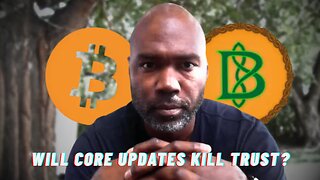Premium Only Content

Episode 3052: The Hidden Flame by Sharon
The Hidden Flame: The Mission of the Holy Spirit from Creation to Pentecost
Introductory Prayer
In the name of the Father, and of the Son, and of the Holy Ghost. Amen.
O Holy Spirit, Spirit of Truth, Love, and Life, enlighten our minds, enkindle our hearts, and sanctify our souls as we meditate today on Thy hidden and glorious work from the beginning of time to the birth of Holy Mother Church.
Fill us with awe before the mysteries of Creation, Redemption, and Sanctification.
Help us to recognize Thy presence in the Sacred Scriptures, in the Church, and in our own lives.
Come, O Creator Spirit, visit our minds with Thy heavenly grace, and prepare us to receive Thy gifts in full measure.
Amen.
Today, we embark on a profound journey tracing the mission of the Holy Spirit from the first moments of creation through to the glory of Pentecost.
For those who are new to the Catholic faith, or those returning after many years, I gently caution: today’s topic may be a heavy lift.
The mystery of the Holy Spirit is rich, deep, and foundational but it demands the building blocks of faith and catechesis to fully appreciate.
Nonetheless, if we proceed humbly and prayerfully, the rewards are great. For to know the Holy Spirit is to touch the very fire of God's own love and life.
Segment One: The Spirit at the Dawn of Creation
We begin at the very first pages of Sacred Scripture: Genesis 1:2.
"And the earth was void and empty, and darkness was upon the face of the deep; and the Spirit of God moved over the waters."
The traditional Catholic understanding, taught by the Fathers and confirmed by the Doctors of the Church, is clear: this "Spirit of God" is none other than the Holy Ghost, the Third Person of the Blessed Trinity.
St. Augustine writes in his De Genesi ad Litteram:
"The Spirit of God, which according to the doctrine of the Trinity is personally the Holy Spirit, was moving above the waters."
Likewise, St. Basil the Great, in De Spiritu Sancto, declares:
"The Spirit of sanctification, the Spirit of life, who moved over the waters at the beginning this same Spirit is active in creation."
And St. Thomas Aquinas confirms in his Summa Theologiae:
"The name 'Spirit,' when applied to God, especially denotes the Holy Ghost."
So, from the very beginning, the Holy Spirit is revealed as life-giver, order-bringer, sanctifier.
Segment Two: Foreshadowings of the Holy Spirit in the Old Testament
The Spirit’s work did not cease at creation. Throughout salvation history, He continued to act often hidden, yet always present.
Some key moments include:
• Genesis 2:7 — God breathes life into Adam; "breath" (Hebrew ruach) is a sign of the Spirit.
• Numbers 11:25 — A portion of God’s Spirit empowers the seventy elders, prefiguring the apostolic mission.
• Isaiah 11:2 — A prophecy of the Messiah upon Whom the Spirit would rest in fullness.
• Joel 2:28 — God's promise to pour out His Spirit upon all flesh, a prophecy fulfilled at Pentecost.
In every age, the Holy Ghost is life, wisdom, strength, prophecy, and sanctification.
As the Catechism of the Council of Trent teaches:
"In the very beginning of the world, we hear of the Spirit of God moving over the waters, a clear sign that the Holy Spirit exercised His divine power in the work of creation."
Segment Three: Full Revelation in Christ
Yet the Holy Spirit remained largely hidden until the coming of Christ.
At the Annunciation (Luke 1:35), Gabriel proclaims to Our Lady: "The Holy Ghost shall come upon thee, and the power of the Most High shall overshadow thee."
At the Baptism of Christ (Luke 3:22), the Spirit descends visibly in the form of a dove.
Throughout Christ’s life, mission, Passion, and Resurrection, the Spirit is ever at work but the full outpouring would come only after Christ's victory over death.
On Easter Sunday night (John 20:22), the Risen Christ breathes on the Apostles: "Receive the Holy Ghost."
But it is at Pentecost fifty days after the Resurrection that the Holy Spirit descends with power upon the Church.
The hidden flame bursts into a blazing fire.
Acts 2 recounts: "And there appeared to them parted tongues as it were of fire, and it sat upon every one of them. And they were all filled with the Holy Ghost..."
Segment Four: Key Themes from the Fathers
What do the Fathers teach us about this great movement of the Spirit?
• Life-Giver — From creation to new birth in Baptism.
• Sanctifier — Preparing souls to be temples of God.
• Strength-Giver — Empowering leaders, prophets, and apostles.
• Revealer of Truth — Teaching hearts and minds all things.
• Missionary Flame — Sending forth the Church to baptize all nations.
St. Gregory Nazianzen (NAZ-ee-AN-zen) calls the Holy Spirit:
"The light that enlightens every man, the fire that purifies, the water that refreshes, the hand that molds us, the sword that wounds and heals."
Segment Five: Final Reflection - The Spirit in Our Lives
The same Spirit who moved over the primordial waters…
who breathed life into Adam…
who filled the prophets…
who overshadowed Mary…
who descended upon the Apostles…
That same Spirit is given to us today through the Sacraments of Baptism and Confirmation.
He continues to sanctify, to guide, and to strengthen each of us if we but cooperate with His grace.
Today, as we walk through the days of Paschaltide, awaiting Pentecost,
let us pray daily: "Come, Holy Ghost, fill the hearts of Thy faithful, and enkindle in them the fire of Thy love."
The hidden flame has been revealed and we are called not only to witness it, but to become living flames ourselves.
Now before reciting the conclusionary prayer you may ask “what was such a heavy lift about this episode?”. It leads into a very profound episode around the Holy Ghost that led to the Great Schism and so stay tuned and let me educate you further.
Conclusionary Prayer
O God, Who didst instruct the hearts of Thy faithful by the light of the Holy Ghost, grant that by the gift of the same Spirit we may be always truly wise and ever rejoice in His consolation.
Breathe into us anew, O Spirit of the Living God; revive our weary hearts, sanctify our souls, and set them ablaze with divine charity.
May the hidden flame that shone at Creation and burst forth at Pentecost burn brightly within us until we reach the eternal day where no shadow shall fall, and Thy glory shall be our everlasting light.
Through Christ Our Lord.
Amen.
In the name of the Father, and of the Son, and of the Holy Ghost. Amen.
Outtakes
"The Hidden Flame: The Mission of the Holy Spirit from Creation to Pentecost"
I have touched on this before and usually in the Pascaltide (Time between Easter and Pentecost). Now I warn you that for any of you who are new to the Catholic faith or coming back after many years of being away or only having training in the faith since Vatican II, this topic could be a heavy lift and probably wouldn’t recommend it. I think like any other educational progression you first need the building blocks.
I am going to provide a series on the Holy Spirit that will take us even through the great schism of the Church but I want to start by explaining some basics.
According to traditional Catholic teaching, the first revelation of the Holy Spirit — though not fully explained yet — appears at the very beginning of Scripture:
Genesis 1:2
"And the earth was void and empty, and darkness was upon the face of the deep; and the Spirit of God moved over the waters."
(Latin Vulgate: "Spiritus Dei ferebatur super aquas.")
In Genesis 1:2, the "Spirit of God" (Spiritus Dei) is traditionally understood by the Catholic Church Fathers and theologians to be the Holy Spirit — the Third Person of the Blessed Trinity.
The early Church, particularly through St. Augustine, St. Gregory Nazianzen, and later theologians like St. Thomas Aquinas, confirmed that this "Spiritus Dei" is not merely a poetic way of speaking about God's power, but a direct reference to the Holy Ghost.
________________________________________
Other early foreshadowings of the Holy Spirit in the Old Testament that the traditional Catholic understanding recognizes include:
• Genesis 2:7 — God "breathes" life into Adam ("breath" being a symbol of the Spirit).
• Numbers 11:25 — God gives Moses and the elders a portion of His Spirit.
• Isaiah 11:2 — "And the Spirit of the Lord shall rest upon him..." (a prophecy of the Messiah).
• Joel 2:28 — "I will pour out My Spirit upon all flesh...", fulfilled at Pentecost.
However, the full revelation of the Holy Spirit’s Personhood and divinity comes only in the New Testament, especially at:
• The Annunciation (Luke 1:35 — "The Holy Ghost shall come upon thee."),
• The Baptism of Christ (Luke 3:22 — the Holy Ghost descends like a dove),
• Pentecost (Acts 2 — where the Holy Spirit descends upon the Apostles).
________________________________________
Summary
• First Mention: Genesis 1:2 ("Spirit of God moving over the waters")
• Full Revelation: Only in the New Testament through Christ and the Apostles.
• Traditional Interpretation: The Holy Spirit is eternally God, co-equal and co-eternal with the Father and the Son, already active at the very beginning of creation.
Here’s a detailed explanation with direct references from key Church Fathers and Doctors of the Church on Genesis 1:2 and the Holy Spirit:
1. St. Augustine (354–430 AD)
Work: De Genesi ad Litteram ("The Literal Meaning of Genesis")
St. Augustine taught that the "Spirit of God" in Genesis 1:2 is the Holy Ghost, the Third Person of the Trinity:
Quote:
"The Spirit of God, which according to the doctrine of the Trinity is personally the Holy Spirit, was moving above the waters."
(De Genesi ad Litteram, Book 1, Chapter 7)
• Augustine stresses that the "Spiritus Dei" is not merely God's "power" or "will" but an actual divine Person, consubstantial (of the same substance) with the Father and the Son.
• He explains that the Spirit’s "moving over the waters" symbolizes the preparation and ordering of the chaotic creation.
2. St. Basil the Great (c. 329–379 AD)
Work: De Spiritu Sancto ("On the Holy Spirit")
St. Basil strongly defends the divinity of the Holy Spirit and directly links Genesis 1:2 to the Holy Spirit's role:
Quote:
"The Spirit is always counted together with the Father and the Son. The Spirit of sanctification, the Spirit of life, who moved over the waters at the beginning — this same Spirit is active in creation."
(De Spiritu Sancto, Chapter 16)
• For Basil, the Spirit is eternally active — not created later, but fully God from the beginning.
• His movement over the waters is a symbol of life-giving action — bringing order, sanctification, and life to creation.
3. St. Thomas Aquinas (1225–1274 AD)
Work: Summa Theologiae (Part I, Question 36)
St. Thomas, synthesizing the Fathers, affirms that the "Spirit of God" refers to the Holy Ghost:
Quote:
"The name 'Spirit,' when applied to God, especially denotes the Holy Ghost; and hence, in the beginning, it is said, 'The Spirit of God moved over the waters.'"
(Summa Theologiae, I, q. 36, a. 1)
• Aquinas teaches that the term "spirit" points to the procession of Love within the Trinity — the Holy Ghost proceeds from the mutual love of the Father and the Son.
• The Spirit's movement in Genesis reveals His sanctifying power already at the beginning of time.
4. The Catechism of the Council of Trent (1566)
(also called the Roman Catechism)
In explaining the Trinity, the Council of Trent’s Catechism cites Genesis 1:2 as an early biblical indication of the Holy Ghost:
Quote:
"In the very beginning of the world, we hear of the Spirit of God moving over the waters, a clear sign that the Holy Spirit exercised His divine power in the work of creation."
(Catechism of the Council of Trent, Part I, Article I)
5. Summary of the Traditional View
Aspect Traditional Catholic Teaching
Genesis 1:2 The "Spirit of God" = the Holy Spirit (Third Person of the Trinity)
Meaning of "moving over the waters" Symbol of the Holy Spirit's life-giving, sanctifying power
Role in Creation Active with the Father and the Son from the beginning
Later Revelation Full Personhood and divinity revealed through Christ (NT)
Here’s a short and clear chart tracing Old Testament foreshadowings of the Holy Spirit, along with how the Church Fathers traditionally interpreted them:
Foreshadowings of the Holy Spirit in the Old Testament
Old Testament Passage Description Traditional Catholic Interpretation (Fathers & Theologians)
Genesis 1:2 "The Spirit of God moved over the waters." The Holy Spirit is present from the beginning, preparing and giving life to creation (St. Augustine, St. Basil).
Genesis 2:7 "God breathed into his nostrils the breath of life." "Breath" (ruach in Hebrew) is a symbol of the Holy Spirit giving the soul its spiritual life (St. Ambrose, St. Augustine).
Exodus 31:3 "I have filled him with the Spirit of God..." (speaking of Bezalel) The Holy Spirit bestows wisdom and skill; a type of His gifts in the New Covenant (St. Cyril of Jerusalem).
Numbers 11:25 "The Spirit rested upon the seventy elders." The Spirit’s presence empowers leaders; foreshadowing Pentecost when the Spirit rests on the Apostles (St. Gregory of Nyssa).
Judges 6:34 "The Spirit of the Lord clothed Gideon." The Spirit strengthens chosen leaders for divine missions (St. John Chrysostom).
1 Samuel 10:6 "The Spirit of the Lord will come upon you, and you will be changed into another man." (to Saul) The transformative power of the Spirit to sanctify and direct souls (Origen, St. Jerome).
Isaiah 11:2 "The Spirit of the Lord shall rest upon him..." Direct prophecy of Christ, filled perfectly with the Holy Spirit (St. Jerome, St. Augustine).
Ezekiel 36:26-27 "I will put My Spirit within you..." Promise of inner renewal through the Holy Spirit — fulfilled in the Church (St. Cyril of Jerusalem).
Joel 2:28-29 "I will pour out My Spirit on all flesh..." Prophecy of Pentecost — the universal outpouring of the Holy Spirit (St. Peter quotes this in Acts 2!).
Key Themes the Fathers Highlighted:
• The Spirit is the giver of life (Genesis, Ezekiel).
• The Spirit brings wisdom, courage, and prophecy (Exodus, Numbers, Judges).
• The Spirit will transform hearts and renew mankind fully through Christ (Isaiah, Joel).
• The full revelation of the Holy Spirit comes only through Christ — especially after His death and resurrection.
Summary
While the Holy Spirit was already active throughout salvation history, He remained hidden until Christ revealed Him fully in the New Covenant at the Annunciation, Baptism, and Pentecost.
The early Fathers saw these Old Testament appearances as beautiful prefigurations of the Spirit’s later, glorious mission in the Church.
Here’s a clear, one-page "Timeline of the Holy Spirit in Salvation History", built from a Traditional Catholic perspective
Timeline of the Holy Spirit in Salvation History
(According to Traditional Catholic Teaching)
Creation and Early Humanity
• Genesis 1:2 — "The Spirit of God moved over the waters."
➔ Holy Spirit present at Creation, giving order and life.
• Genesis 2:7 — "God breathed into Adam’s nostrils the breath of life."
➔ Breath (ruach) = Symbol of Spirit, giving life to the soul.
Patriarchs and Exodus
• Genesis 41:38 — Joseph is filled with the Spirit of God to interpret dreams.
➔ The Spirit grants wisdom and discernment.
• Exodus 31:3 — Bezalel is filled with the Spirit to build the Tabernacle.
➔ The Spirit bestows skill and artistic genius for sacred worship.
• Numbers 11:25 — The Spirit rests upon the seventy elders.
➔ Prefigures Apostolic mission and Pentecost.
Judges and Kings
• Judges 6:34 — The Spirit of the Lord clothed Gideon.
➔ The Spirit empowers for leadership and battle.
• 1 Samuel 10:6 — Saul receives the Spirit and is changed into a new man.
➔ Symbolizes interior transformation by the Spirit.
Prophets Foretell the Coming Spirit
• Isaiah 11:2 — "The Spirit of the Lord shall rest upon him..." (prophecy of the Messiah).
➔ Seven gifts of the Spirit foretold: wisdom, understanding, counsel, fortitude, knowledge, piety, fear of the Lord.
• Ezekiel 36:26-27 — "I will put My Spirit within you."
➔ Promise of new hearts and interior grace.
• Joel 2:28-29 — "I will pour out My Spirit upon all flesh."
➔ Foreshadows Pentecost — the Spirit given not just to a few, but to all who believe.
Christ’s Life and Mission
• Luke 1:35 — The Holy Spirit overshadows Mary at the Annunciation.
➔ Incarnation: Christ is conceived by the power of the Holy Ghost.
• Luke 3:22 — At Christ's Baptism, the Holy Spirit descends like a dove.
➔ Public revelation of Christ’s mission anointed by the Spirit.
• Luke 4:1 — Jesus is led by the Spirit into the desert.
➔ Christ acts in perfect union with the Holy Spirit.
Passion, Resurrection, and Pentecost
• John 20:22 — Jesus breathes on the Apostles: "Receive the Holy Ghost."
➔ Anticipation of full outpouring of the Spirit; authority to forgive sins.
• Acts 2:1-4 — Pentecost: The Holy Spirit descends upon the Apostles as tongues of fire.
➔ Birth of the Church.
➔ Apostles are strengthened, enlightened, and sent to evangelize the world.
Key Themes
Theme Meaning
Life-giver From creation onward, the Spirit gives life.
Wisdom and Strength Spirit empowers God’s chosen leaders.
Prophetic Foresight Spirit foretells the coming of the Messiah and the Church.
Sanctification Spirit transforms hearts into temples of God.
Mission Spirit sends the Church to convert all nations.
Final Note:
• The Holy Spirit is co-eternal, co-equal, and consustantial with the Father and the Son — fully revealed by Christ, but active from the very beginning.
• The Fathers (especially St. Augustine, St. Basil, and St. Thomas Aquinas) consistently saw the Spirit as the hidden flame preparing mankind for the coming of the Savior.
________________________________________
The Holy Spirit in Salvation History: A Flowchart
Creation
↓
Genesis 1:2 — Spirit moves over the waters
↓
Genesis 2:7 — Breath of life into Adam
↓
Patriarchs
↓
Joseph filled with Spirit (Genesis 41:38)
↓
Moses and 70 Elders empowered (Numbers 11:25)
↓
Judges and Kings
↓
Gideon "clothed" in Spirit (Judges 6:34)
↓
Saul transformed by Spirit (1 Samuel 10:6)
↓
Prophets Foretell
↓
Isaiah: Spirit rests on Messiah (Isaiah 11:2)
↓
Ezekiel: New heart and Spirit within (Ezekiel 36:26-27)
↓
Joel: Spirit poured out on all flesh (Joel 2:28-29)
↓
Christ’s Life and Mission
↓
Annunciation — Spirit overshadows Mary (Luke 1:35)
↓
Baptism of Christ — Spirit descends like a dove (Luke 3:22)
↓
Jesus led by Spirit into desert (Luke 4:1)
↓
Passion and Resurrection
↓
Jesus breathes the Spirit onto Apostles (John 20:22)
↓
Pentecost
↓
Holy Spirit descends as tongues of fire (Acts 2:1-4)
↓
Birth of the Church
↓
Spirit continues to sanctify, guide, and strengthen the Church until the end of time
Notes on the Flow
• Genesis: The Spirit gives life and order at Creation.
• Patriarchs and Exodus: The Spirit grants wisdom and leadership.
• Judges and Kings: The Spirit empowers rulers for divine missions.
• Prophets: The Spirit announces future renewal through Christ.
• Christ: The Spirit fully revealed in the Person and mission of Jesus.
• Pentecost: The Spirit is poured out on the Church for all nations.
• Church Age: The Holy Spirit continues to sanctify souls through the sacraments and guide the Church until Christ's Second Coming.
-
 16:07
16:07
Ken LaCorte: Elephants in Rooms
14 hours ago $3.50 earnedWhy firefighting got political
17.7K5 -
 8:31
8:31
Rethinking the Dollar
18 hours agoBitcoin Secrets Nobody Talks About!
11.1K5 -
 2:36:47
2:36:47
DLDAfterDark
8 hours ago $4.01 earnedIs The Left Recruiting To KILL Conservatives? Hey Fascist, CATCH!
12.4K2 -
 22:53
22:53
Jasmin Laine
1 day agoParliament ERUPTS After "WORST Decision EVER!"—Carney Left SPEECHLESS by SHOCKING Report
37.9K83 -
 11:50
11:50
Mrgunsngear
1 day ago $11.44 earnedSteiner MPS Enclosed Red Dot: Better Than The ACRO P2? 🔴
40.4K19 -
 1:27:55
1:27:55
Sarah Westall
1 day agoSelecting World Leaders: Intelligence No Longer a Prerequisite w/ Martin Armstrong
48K34 -
 2:03:07
2:03:07
Badlands Media
1 day agoDevolution Power Hour Ep. 393: Synthetic Reality, and the RICO Grande Strategy
83.6K31 -
 11:23:18
11:23:18
GritsGG
15 hours agoQuad Win Streaks!🫡 Most Wins in WORLD! 3600+
86.5K10 -
 41:16
41:16
MattMorseTV
10 hours ago $97.84 earned🔴Antifa is PREPARING for WAR.🔴
83.7K445 -
 2:55:38
2:55:38
cosmicvandenim
18 hours agoCOSMIC VAN DENIM | Horror Game | STOREBOUND
31.7K4